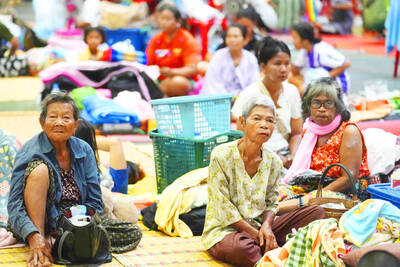Malaysian Prime Minister Abdullah Ahmad Badawi defended his record on battling corruption, crime and inflation as he seeks a new five-year mandate in general elections likely to be held next month.
Abdullah, whose popularity has dwindled since taking office in 2003, acknowledged in an interview with the Star newspaper that unhappiness among ethnic minority Indians would hurt support for his ruling coalition. The interview was published yesterday.
Indians are demanding economic equality, saying they have suffered because of an affirmative action program for Malays, who represent around 60 percent of the country's 27 million people. In November, some 20,000 Indians marched in an unprecedented anti-government demonstration.
Abdullah denied there is discrimination against Indians, who make up about 8 percent of the population.
"There are not just poor Indians, but also poor Chinese, Malays ... this is why eradicating poverty among Malaysians, and I stress the word Malaysians, has been on our agenda and remains one of our priorities," he said.
"More evident than before, we have corrected the social imbalance by providing better infrastructure, basic needs and quality of life. In both rural and urban areas, necessary steps have been taken to ensure there is steady growth regardless of race or religion," Abdullah said.
Elections, which are not due until next year, are widely expected to be held next month. Among the biggest challenges facing the government are inflation, rising crime, corruption and tensions in society because of the Indian unrest.
Given the problems, the National Coalition is not likely to repeat its record 2004 election performance when it won 96 percent of parliamentary seats.
A recent poll by the Merdeka Center showed Abdullah's approval rating slipped to an all-time low of 61 percent in December, from 91 percent in late 2004.
Abdullah said rising inflation and high fuel prices were a global phenomena and the government would be forced to cut fuel subsidies, which cost the treasury about 40 billion ringgit (US$12 billion) a year.
"It is convenient to blame the government, but people should really look at it as a global issue," he said.

FOREST SITE: A rescue helicopter spotted the burning fuselage of the plane in a forested area, with rescue personnel saying they saw no evidence of survivors A passenger plane carrying nearly 50 people crashed yesterday in a remote spot in Russia’s far eastern region of Amur, with no immediate signs of survivors, authorities said. The aircraft, a twin-propeller Antonov-24 operated by Angara Airlines, was headed to the town of Tynda from the city of Blagoveshchensk when it disappeared from radar at about 1pm. A rescue helicopter later spotted the burning fuselage of the plane on a forested mountain slope about 16km from Tynda. Videos published by Russian investigators showed what appeared to be columns of smoke billowing from the wreckage of the plane in a dense, forested area. Rescuers in

POLITICAL PATRIARCHS: Recent clashes between Thailand and Cambodia are driven by an escalating feud between rival political families, analysts say The dispute over Thailand and Cambodia’s contested border, which dates back more than a century to disagreements over colonial-era maps, has broken into conflict before. However, the most recent clashes, which erupted on Thursday, have been fueled by another factor: a bitter feud between two powerful political patriarchs. Cambodian Senate President and former prime minister Hun Sen, 72, and former Thai prime minister Thaksin Shinawatra, 76, were once such close friends that they reportedly called one another brothers. Hun Sen has, over the years, supported Thaksin’s family during their long-running power struggle with Thailand’s military. Thaksin and his sister Yingluck stayed

‘ARBITRARY’ CASE: Former DR Congo president Joseph Kabila has maintained his innocence and called the country’s courts an instrument of oppression Former Democratic Republic of the Congo (DR Congo) president Joseph Kabila went on trial in absentia on Friday on charges including treason over alleged support for Rwanda-backed militants, an AFP reporter at the court said. Kabila, who has lived outside the DR Congo for two years, stands accused at a military court of plotting to overthrow the government of Congolese President Felix Tshisekedi — a charge that could yield a death sentence. He also faces charges including homicide, torture and rape linked to the anti-government force M23, the charge sheet said. Other charges include “taking part in an insurrection movement,” “crime against the

POINTING FINGERS: The two countries have accused each other of firing first, with Bangkok accusing Phnom Penh of targeting civilian infrastructure, including a hospital Thai acting Prime Minister Phumtham Wechayachai yesterday warned that cross-border clashes with Cambodia that have uprooted more than 130,000 people “could develop into war,” as the countries traded deadly strikes for a second day. A long-running border dispute erupted into intense fighting with jets, artillery, tanks and ground troops on Thursday, and the UN Security Council was set to hold an emergency meeting on the crisis yesterday. A steady thump of artillery strikes could be heard from the Cambodian side of the border, where the province of Oddar Meanchey reported that one civilian — a 70-year-old man — had been killed and